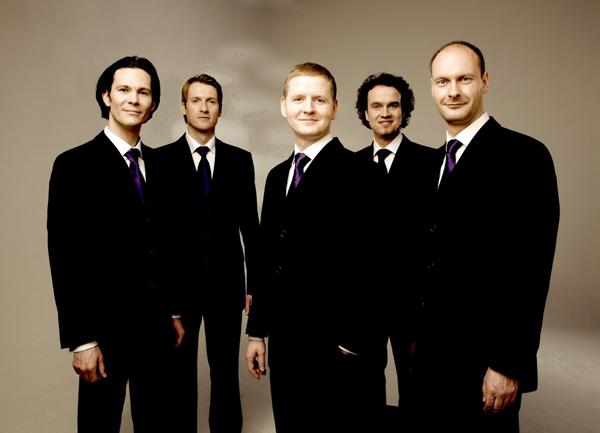Hometown of A Capella Group ‘amarcord’
Ensemble amarcord (Photo: Martin Jehnichen)
For the Geo Quiz, we’re looking for a German city, about 120 miles southwest of Berlin, in the German state of Saxony. This city has a famous university, which was founded in 1409 and back in the 1700s, it was home to composer Johann Sebastian Bach for 27 years. More recently it was located in the former East Germany where it played a big role in the fall of the communist regime there.
The answer is Leipzig. The Arab Spring of this year has resurrected memories of the fall of the Berlin Wall in 1989. We chose Leipzig because it’s the place where a previous generation’s popular protests helped lead to the downfall of an entrenched regime.
Leipzig is also the home of five musicians who make up the group amarcord, one of the top a capella ensembles in the world.
The members of amarcord were between 9 and 15 years old when communism began to falter in East Germany. At the time, the five musicians were singers in the prestigious St.Thomas Boys Choir in Leipzig, the same choir once lead by Johann Sebastian Bach. The boys didn’t join in the protests, but their parents did. Each week, they gathered at a church in the medieval town center, The Saint Nikolai Church.
At first, the demonstrations were modest. Every Monday night, anyone brave enough and fed-up enough with life under the communist regime, would gather at the church. At first, they held peace vigils. By 1989, the crowds grew bigger and more forceful. They carried candles around the old town and even marched past the Stasi secret police headquarters in Leipzig. They called for freedom and for fair elections, and for NATO and the Soviet Union to pull their nuclear weapons from German soil.
The boy singers ‘sort of’ understood what was transpiring in their hometown. They knew the deprivations of communism in East Germany, because their choir had seen the relative wealth and freedom outside their borders.
Daniel Knauft was a member of the choir:
“We knew the world outside because with St. Thomas Boys’ Choir we were allowed to travel, so we could for instance, travel to West Germany and we could travel to Japan in the year of 1985, it was a big Bach anniversary year and so we knew many parts of the world but knowing them and having to come back to where your parents and your family stayed, who were not allowed usually to move or to see the world…felt that was really mixed feelings.”
Now, the Berlin Wall wasn’t near Leipzig. It was about 120 miles away. The wall fell on November 9th, 1989. But something happened weeks earlier in Leipzig that was a harbinger for the eventual fall of the wall.
“A month before the wall would come down- that was the turning point of the whole story, because the army was there — just like nowadays in Libya — to shoot at their own people,” says Knauft. ” And, ah — they didn’t. It’s really a miracle of biblical dimensions in a way. Those young men, they were just a little bit older than we were then and they could’ve got the order to shoot at their people— There were many, ten thousand people outside on the street meeting other peoples to ask for democracy and a better way. And when that was peaceful, the path was paved to the wall coming down, actually. And that makes Leipzig people really proud because we are part of that history and those were our parents.”
One month later, the night the Berlin Wall came down in a peaceful demonstration, The St. Thomas Boys Choir was performing in West Germany. The boys couldn’t even phone home, because so few East Germans had a telephone.
More than 20 years later, the five former choir boys are living a life that would have been unattainable if the Berlin Wall hadn’t come down. They perform a-capella music all around the globe. They just finished a tour of the US. They’ve created their own a capella music festival in Leipzig. The 12th fest kicks off next week. It’ll feature, among others, America vocal wizard Bobby McFerrin.
And amarcord even formed their own record label — an impossibility in the former East Germany. The five former choir boys still sing the traditional German songs they love- in honor of the land they love.
